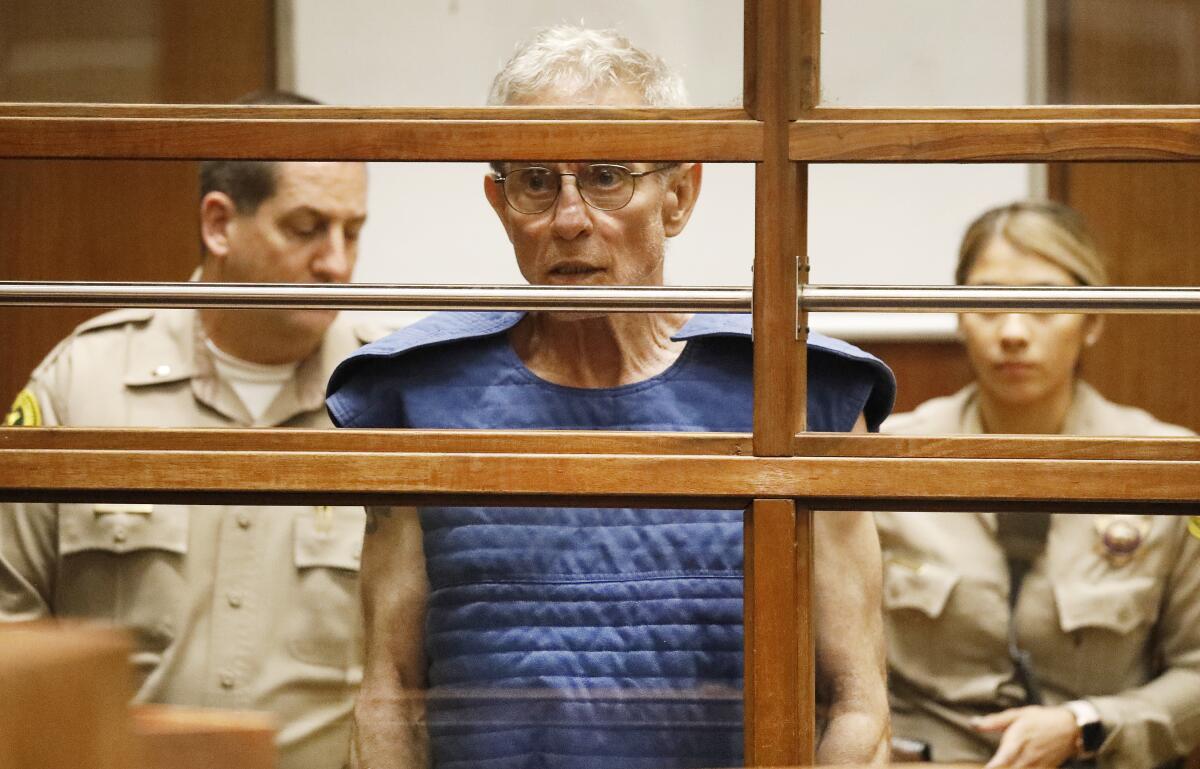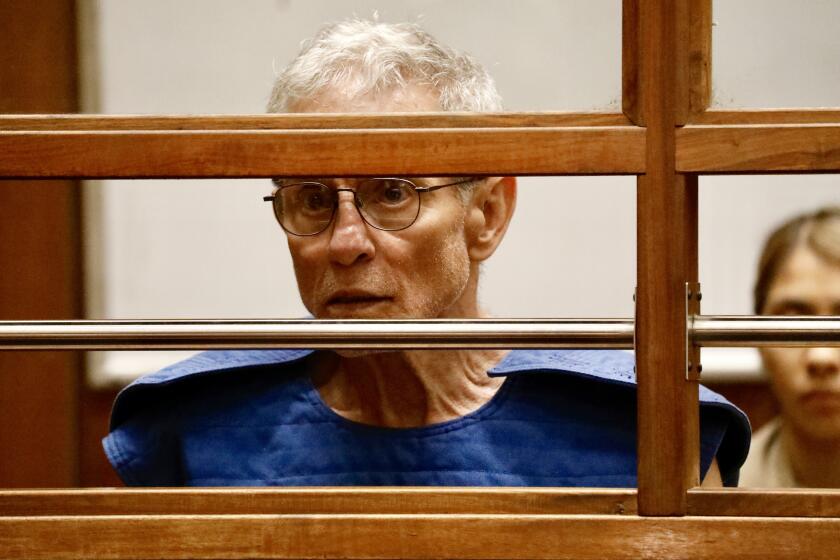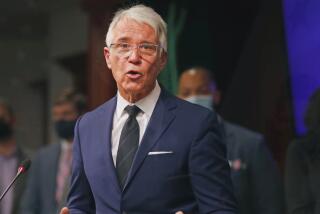Judge undercuts ex-D.A. Jackie Lacey’s initial decision not to charge Ed Buck in fatal overdose

A federal judge has ruled that Los Angeles County sheriff’s deputies acted properly when they seized drugs and other evidence from the West Hollywood home of Democratic donor Ed Buck after a man was found dead there in 2017.
The ruling raises new questions about why L.A. County prosecutors initially declined to charge Buck with a crime and then belatedly did so two years later after federal prosecutors built a case against him.
Buck, who is awaiting trial on federal drug charges stemming in part from the man’s drug overdose, asked U.S. District Judge Christina A. Snyder to bar prosecutors from using as evidence syringes, drug paraphernalia and nearly two grams of methamphetamine deputies discovered in what Buck called an illegal search of his apartment.
Snyder denied the request. In a ruling Wednesday, she wrote that Buck effectively invited law enforcement into his home when he called 911 to report the overdose of 26-year-old Gemmel Moore during a “party and play” sexual encounter. The deputies’ presence was lawful and the drug evidence was “in plain view,” she found, so prosecutors are free to use it in their case against Buck.
“The evidence they ultimately saw and seized was mere feet from Moore’s body,” Snyder wrote.
The judge’s decision was a victory for federal prosecutors, who allege that Buck, 66, provided the meth that resulted in Moore’s death. They say Buck systematically targeted often destitute Black men, luring them to his home for sex and drugs, in some cases injecting them with meth when they were unconscious. Seventeen months after Moore’s death, another man died of a meth overdose in Buck’s apartment.
Snyder’s ruling undercut the finding of Jackie Lacey, when she was L.A. County district attorney, that the drug evidence could not be used to file charges against Buck in Moore’s death. Lacey argued that sheriff’s deputies had no legal right to pick up the meth and paraphernalia that they saw in Buck’s apartment as emergency workers were trying to resuscitate Moore.

In a brief 2018 memo declining to prosecute Buck for Moore’s overdose, county prosecutors noted an “inadmissible search and seizure” had taken place but did not elaborate.
In 2019, Lacey told Spectrum News that sheriff’s deputies in Buck’s apartment “saw that Mr. Moore was dead, but they investigated it sort of like an overdose.”
“They found some things, but we contend that it’s illegal how they searched for it,” she said. “They needed a warrant in order to get that stuff.”
Lacey also defended her rationale at a gathering of the Stonewall Democratic Club, telling the LGBTQ group that deputies and a coroner’s office investigator improperly searched a red tool chest containing drugs inside Buck’s home.
By then, federal prosecutors had filed drug charges against Buck. He faces a nine-count indictment that includes charges of distributing drugs leading to death and enticement to travel across state lines to engage in prostitution.
In a March 2 hearing held over Zoom, Snyder heard testimony on the tool chest from Buck, who was in jail, and Sheriff’s Deputy Grehtel Barraza.
Barraza said she noticed a bulbous pipe and a plastic bag with white crystalline residue in drawers of the tool chest that were open, along with drugs on the kitchen table. Buck testified that he was “ninety-nine and forty-four one-hundredths” percent sure the drawers were closed, because the tool chest could tip over if they were left open.
But prosecutors showed the judge a video from Buck’s computer that appeared to show Moore smoking something with the tool chest just behind him and its drawers open. Snyder said she found the deputy’s testimony more credible than Buck’s.
Democratic donor Ed Buck’s arrest, long sought by activists, sparks questions of why the process took so long.
Legal experts said there should be no difference in how state or federal prosecutors evaluate whether police have violated the constitutional ban on “unreasonable searches and seizures.”
“The 4th Amendment standard is the same whether it is in federal court or state court,” said Erwin Chemerinsky, dean of the UC Berkeley law school.
Laurie Levenson, a Loyola Law School professor and former federal prosecutor, said it was “not a good reflection on the D.A.’s office that Judge Snyder pretty quickly found evidence admissible that the D.A. didn’t see as admissible for prosecution.”
“The horrifying thing is that, in being so cautious, the downside is great,” she said. “What’s of grave concern here is that I think there were just a lot of signals that this was a really serious event that was putting people in danger, so you might want to move as aggressively as the law would permit.”
Levenson said Buck could have at least been charged with drug offenses. It’s a concern, she added, that Buck was allegedly able to keep engaging in behavior that led to another man’s death months after Lacey declined to prosecute him for Moore’s overdose.
Wealthy Democratic donor Ed Buck has been under scrutiny ever since a young man died of a drug overdose in his home in 2017. But despite ample evidence of drug activity and dangerous behavior at Buck’s West Hollywood apartment, local authorities did not lob criminal charges at him until last week.
Both Lacey and a spokesman for current Dist. Atty. George Gascón declined requests for comment on the ruling or how it might affect any future state prosecution of Buck. He faces a maximum penalty of life in prison without parole if convicted at his federal trial, which is set to start July 21.
Two days before Buck was charged with federal drug crimes in September 2019, L.A. County prosecutors charged him with operating a drug den and battery after a third man overdosed on meth in his apartment but survived. That case is on hold as the federal prosecution proceeds. It could be moot if Buck is convicted.
Buck’s lawyer, Ludlow B. Creary II, said he was disappointed in Snyder’s ruling. “We’ll see what the jury thinks of the deputy’s assertion that she could easily see these things in plain view,” he said.
Until Moore’s overdose, Buck was a fixture of Democratic politics in West Hollywood. A former member of the Stonewall Democratic Club’s steering committee, he made frequent donations to Democratic candidates for local, state and federal office.
Jasmyne Cannick, a political consultant who has advocated for Moore’s family and organized protests demanding Buck’s prosecution, said Snyder’s ruling was a sign of Lacey’s mishandling of the case. “I don’t think she took it as seriously as she should have,” Cannick said.
In 2010, then-California gubernatorial candidate Meg Whitman was holding a political rally at a Hollywood hotel when from the front row a man started heckling her.
Lacey, who was ousted by Gascón in the November election, raised other concerns about hurdles to prosecuting Buck. The statements of other men who made claims of misconduct by Buck in their own “party and play” encounters could not be corroborated, she argued.
Nonetheless, federal prosecutors plan to rely on the men’s testimony to establish a pattern of behavior similar to what they say led to the fatal overdoses of Moore and, 17 months later, 55-year-old Timothy Dean of West Hollywood.
In another ruling Wednesday, Snyder rejected Buck’s request to bar prosecutors from having the men testify about what they say was Buck’s habit of using racial slurs. At the same time, she barred “the use of the ‘N’ word,” saying language “in police reports and otherwise should be sanitized.”
More to Read
Sign up for Essential California
The most important California stories and recommendations in your inbox every morning.
You may occasionally receive promotional content from the Los Angeles Times.















